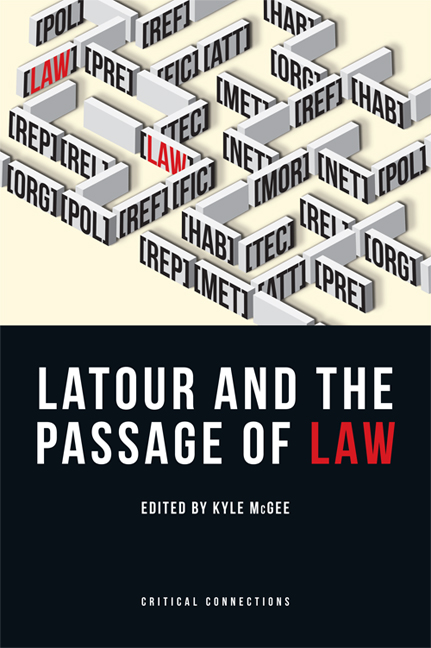Book contents
- Frontmatter
- Contents
- Introduction
- 1 From the Conseil d’État to Gaia: Bruno Latour on Law, Surfaces and Depth
- 2 Politics and Law as Latourian Modes of Existence
- 3 On Devices and Logics of Legal Sense: Toward Socio-technical Legal Analysis
- 4 ‘The Crown Wears Many Hats’: Canadian Aboriginal Law and the Black-boxing of Empire
- 5 Providing the Missing Link: Law after Latour's Passage
- 6 The Life and Deaths of a Dispute: An Inquiry into Matters of Law
- 7 Plasma! Notes on Bruno Latour's Metaphysics of Law
- 8 The Conditions of a Good Judgment: From Law to Internal Affairs Police Investigations
- 9 In The Name of the Law: Ventriloquism and Juridical Matters
- 10 Laboratory Life and the Economics of Science in Law
- 11 Bartleby, Barbarians and the Legality of Literature
- 12 The Strange Entanglement of Jurimorphs
- List of Contributors
- Index
10 - Laboratory Life and the Economics of Science in Law
Published online by Cambridge University Press: 05 September 2016
- Frontmatter
- Contents
- Introduction
- 1 From the Conseil d’État to Gaia: Bruno Latour on Law, Surfaces and Depth
- 2 Politics and Law as Latourian Modes of Existence
- 3 On Devices and Logics of Legal Sense: Toward Socio-technical Legal Analysis
- 4 ‘The Crown Wears Many Hats’: Canadian Aboriginal Law and the Black-boxing of Empire
- 5 Providing the Missing Link: Law after Latour's Passage
- 6 The Life and Deaths of a Dispute: An Inquiry into Matters of Law
- 7 Plasma! Notes on Bruno Latour's Metaphysics of Law
- 8 The Conditions of a Good Judgment: From Law to Internal Affairs Police Investigations
- 9 In The Name of the Law: Ventriloquism and Juridical Matters
- 10 Laboratory Life and the Economics of Science in Law
- 11 Bartleby, Barbarians and the Legality of Literature
- 12 The Strange Entanglement of Jurimorphs
- List of Contributors
- Index
Summary
Introduction
[T]he application of the term ‘sociology’ to a study of scientific activity will be regarded by many scientists as dealing primarily with … a variety of behavioral phenomena which … unavoidably impinge upon scientific practice by virtue of the fact that scientists are social beings; but they are essentially peripheral to the practice itself. In this view, social phenomena occasionally make their presence felt in instances of extreme secrecy, fraud, or on other relatively infrequent occasions. It is only then that the kernel of scientific logic and procedure is severely threatened and scientists find their work disrupted by the intrusion of external factors. (Latour and Woolgar 1986: 20–1)
The significance of Bruno Latour and Steve Woolgar's Laboratory Life (1979, 1986) for science studies can hardly be exaggerated – it provided a theoretical framework and a working model for so many ‘second-wave’ (rejecting the Mertonian ‘first wave’) sociologists of science, some even critical of Latour and Woolgar, who were dealing with diverse questions of science/society interactions in numerous settings. It also anticipated the science wars and provided a (frequently unrecognised) pragmatic alternative to the stereotypical images of social constructivism. Moreover, Chapter 5 of Laboratory Life (exploring the ‘cycle of credibility’ among scientists) anticipated the current interest in the economics of science in science studies. As to law and legal contexts, Laboratory Life anticipated both the Daubert revolution in evidence law, where philosophical questions about the nature and reliability of science would be the subject of US Supreme Court speculation, as well as contemporary concerns over the effects of financial bias on scientific research and expertise.
The term ‘economics of science’ has multiple connotations, referring in the first instance either to the application of economic models to the scientific enterprise, or to the behaviour of scientists as they compete in the ‘market’ for scientific knowledge, perhaps trading in reputation or credibility (e.g. Bourdieu's ‘symbolic capital’) instead of money. Secondarily, the term can refer narrowly to the effect of financial support on research outcomes, or more broadly to the effect of the economy on the scientific enterprise, whether (in either case) positive or negative.
- Type
- Chapter
- Information
- Latour and the Passage of Law , pp. 273 - 303Publisher: Edinburgh University PressPrint publication year: 2015



